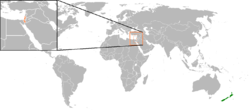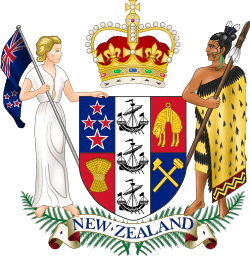Israel–New Zealand relations
 |
|
New Zealand |
Israel |
|---|---|
Israel–New Zealand relations are the foreign relations between Israel and New Zealand.
History
New Zealand has a long history of support for Israel, and voted in favour of the 1947 UN partition resolution, which led to the creation of the State of Israel, despite heavy pressure from the United Kingdom on all Commonwealth nations to abstain on the resolution. New Zealand recognised the State of Israel in January 1949.
New Zealand has an honorary consulate in Tel Aviv and Israel has an embassy in Wellington with an honorary consulate in Auckland.
New Zealand was accredited to Israel from The Hague in 1986. The accreditation was moved to Ankara, Turkey in February 1996. The New Zealand Trade and Enterprise (NZTE) regional office in Dubai and the NZTE office in Ankara, cover Israel. Gad Propper was appointed New Zealand's Honorary Consul to Israel in June 1998.
NZ Foreign Minister Phil Goff visited Israel in May 2003. New Zealand’s Minister for Research, Science and Technology, Pete Hodgson, visited in November–December 2000. A delegation of four senior Israeli Foreign Ministry officials traveled to New Zealand for the inaugural New Zealand-Israel Foreign Ministry Consultations in September 2003. A Knesset delegation visited New Zealand in August 2001.[1]
The Israeli embassy in Wellington closed in October 2002 due to financial reasons, but reopened in 2010 with Shemi Tzur appointed as the Ambassador to New Zealand. In June 2013 he was replaced by Ambassador Yosef Livne.
In 2015 Israel and New Zealand settled a diplomatic dispute that arose when New Zealand assigned an ambassador to Israel who was also slated to be the ambassador to the Palestinians. In September 2014 Israel would not allow Ambassador Jonathan Curr to present his credentials, saying that violated Israel's "well-known policy" of not receiving diplomats who are also received by the Palestinian Authority. New Zealand ended the conflict by appointing separate diplomats to Israel and the Palestinian authority, a move viewed as motivated by its election as a non-permanent member of the United Nations Security Council and its increasing impatience with the council's failure to agree on a UN stance in the Israeli-Palestinian peace process.[2]
Economic ties
In 1994 Israel opened a trade office in Auckland and the New Zealand and Israel Trade Association, known as NZITA, was established.[3] In 2002, New Zealand sent about $12.5 million of exports to Israel and received $60.1 million in imports, including fertilisers, plastic and soap. By 2005, annual exports from New Zealand to Israel reached NZ$16.834 million. Exports were mostly milk and cream (13.8%), electronic circuit boards (11.1%), preserved meat or offal products (10.9%), casein (10.8%), and medications (7.4%). Exports from Israel to New Zealand, mostly manufactured goods like steam turbines (11.3%), industrial water heaters (5.2%), plastic sheets and films (4.7%), telecommunications equipment (4.7%), and inkjet printers (3.8%), reached NZ$88.15 million. Since 2001, Fonterra, New Zealand's largest dairy company, is involved in a joint venture with the Israeli cooperative Tnuva.
Agricultural exports to Israel increased in 2005 and visitor visa waivers are in place to increase business travel and tourism.[1]
Tourism
In April 2011, Israel and New Zealand signed a reciprocal deal that allows tourists to work for three months without an additional visa. The deal was signed by the Speaker of the Knesset, Reuven Rivlin and his New Zealand counterpart Lockwood Smith, when Rivlin was visiting New Zealand.[4]
Diplomatic incidents
Passport scandal
On July 15, 2004, New Zealand imposed diplomatic sanctions against Israel, and suspended high-level contacts between the two countries in July 2005, after two Israeli citizens, Uriel Kelman and Eli Cara, were accused of passport fraud in Auckland. They denied belonging to the Mossad, but received a six-month sentence for trying to enter the country illegally and working with organised criminal gangs.[5] Prime Minister Clark cancelled a planned visit to New Zealand by Israeli President Moshe Katzav, delayed approval for a new Israeli ambassador to New Zealand, and called the case "far more than simple criminal behaviour by two individuals" which "seriously strained our relationship." [6]
Jewish graves in Wellington were vandalised with Swastikas and Nazi slogans carved into and around 16 Jewish graves. David Zwartz, a leader in the Jewish community in New Zealand who was appointed as the Honorary Consul from Israel to New Zealand in 2003, said:"...there is a direct connection between the very strong expressions against Israel and people here feeling they can take it out on Jews. It seems to me Israel-bashing one day, Jew-bashing the next day."[7]
The Israeli Deputy Chief of Staff, Gabi Ashkenazi, was denied permission to visit New Zealand to speak at a private fund-raising event in March 2005 because of the freeze on visits from Israeli officials.[8]
On June 26, 2005 Foreign Minister Shalom sent a letter of apology to the New Zealand government,[9] and said that Israel would take steps to prevent a recurrence of similar incidents.[10]
Diplomatic relations were reinstated on August 30, 2005. Naftali Tamir presented his credentials to Governor-General Dame Silvia Cartwright before a guard of honour. The Foreign Minister's deputy director for Asia and the Pacific, Amos Nadav, said, "We are happy the crisis is behind us and look ahead to the future."[11]
Christchurch earthquake
A combination of unusual events immediately following the death of Ofer Mizrahi, an Israeli backpacker in the 2011 Christchurch earthquake caused the New Zealand government to investigate whether he and his companions had links to Israeli intelligence. The story gained media attention in July 2011 due to the suspicious circumstances that Mizrahi held several foreign passports and in that his companions all left New Zealand within 12 hours of the earthquake and their companion's death.[12][13] New Zealand security officials suspected Mizrahi and his companions were Mossad agents attempting to infiltrate the state's computer databases to gain sensitive information.[14] An investigation that involved the New Zealand Security Intelligence Service concluded that there was no evidence of such an operation, or their involvement with Israeli intelligence.[15]
See also
References
- 1 2 "Israel - Country Information Paper". New Zealand Ministry of Foreign Affairs and Trade.
- ↑ Israel, New Zealand resolve diplomatic spat over new envoy YNET, 29 April 2015
- ↑ Eugene Bingham and Tony Stickley (17 April 2004). "How the trap was sprung". The New Zealand Herald. Retrieved 6 October 2011.
- ↑ Deal to bolster tourism between Israel and New Zealand
- ↑ Young, Audrey (27 June 2005). "A murky tale of bugs and spy claims". The New Zealand Herald. Retrieved 6 October 2011.
- ↑ Israel's New Zealand Problem
- ↑ New Zealand-Israeli row deepens
- ↑ Goodenough, Patrick (15 March 2005). "Government shuts out Israeli general". The New Zealand Herald. Retrieved 6 October 2011.
- ↑ "Israeli ambassador to meet NZ Governor-General". The New Zealand Herald. NZPA. 29 August 2005. Retrieved 6 October 2011.
- ↑ O'Sullivan, Fran (27 June 2005). "Israel remains silent over Mossad role in scandal". The New Zealand Herald. Retrieved 6 October 2011.
- ↑ "Apology opens door for Israeli minister to visit NZ". The New Zealand Herald. NZPA. 28 June 2005. Retrieved 6 October 2011.
- ↑ Claire Trevett and Derek Cheng (21 July 2011). "Israelis 'were just backpackers'". The New Zealand Herald. Retrieved 21 July 2011.
- ↑ "'Israeli spies among New Zealand earthquake casualties". Jerusalem Post. 20 July 2011. Retrieved 21 July 2011.
- ↑ http://www.haaretz.com/news/diplomacy-defense/report-israeli-killed-in-new-zealand-earthquake-was-mossad-agent-1.374109
- ↑ http://www.stuff.co.nz/national/politics/5311491/Investigation-cleared-Israelis-of-spy-claims-PM
External links
- New Zealand Herald: full coverage on Israeli spies case
- Wellington Jewish Community Website
- Auckland Jewish Community Website
- New Zealand Jewish Community Forum

